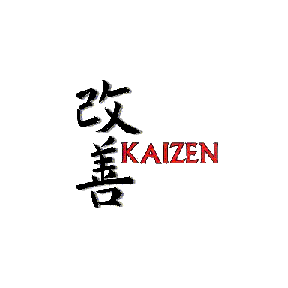 For some people, "organizational culture" calls to mind images of companies such as Google, with elaborate perks intended to lure the best talent and keep it there.
For some people, "organizational culture" calls to mind images of companies such as Google, with elaborate perks intended to lure the best talent and keep it there.
For others, it's the idea of an organization such as Zappos, which wants every employee to meet and keep lifelong friends at work.
For many Lean managers, the first company that comes to mind is Toyota, known for a kaizen culture so strong that death from overwork has become a problem.
The layperson often assumes Lean organizations are low on culture, because many popular definitions of organizational culture involve spending which would be considered wasteful by Lean managers.
Not so! Culture building is, in truth, critical to the success of Lean organizations, as demonstrated by Toyota.
A "Culture of Excellence"
Every organization wants a "culture of excellence," to the point that this oft-repeated jargon has become almost laughable.
But in Lean organizations, it is a genuine goal.
Just look at Ford Motor Company: In boom times, Ford begins to collapse. When on the brink of disaster, the company pulls together and scrapes its way back from the precipice.
Why? As stated by their CEO, Ford stops changing when things are good.
Lean organizations involve commitment to continuous change in the pursuit of excellence. To enhance this culture, create systems by which great ideas are rewarded—and not only by cash or recognition, but by opportunities to lead.
Creating Kaizen Culture in Lean Organizations
On a similar note, Lean organizations should also strive to encourage those persons not naturally oriented toward continuous improvement to thrive and excel. A kaizen culture can create behaviors even in individuals whose natural predispositions run more toward stagnancy.
Culture derives from rituals and norms present in an organization. Where you have continuity of these rituals and norms, and where they are connected to shared values, you have robust culture; it is not necessarily the culture that you want, but it is clearly defined and resilient.
If Lean organizations don't meet your expectations, take two simple steps to create a more kaizen-oriented culture:
- Take an inventory of the social norms and persistent routines that make up culture. Look in particular for those things that typically fly under your radar. You may be more prone to notice the "big" cultural components, but something as simple as a coffee break ritual might be more important.
- Keep the rituals, but bring in kaizen. If coffee breaks are important to your team, make a game of challenging them to design a more efficient system so that everyone can get his coffee at once, and more of the five-minute break time can be devoted to catching up, not bumping into one another filling mugs.
Of course, in practice it is not simple to change a culture. Real-life examples will meet with resistance and accusations of managerial caprice.
However, keep your own personal kaizen quest in mind and devote yourself to imbuing your workplace with the same values, and you will likely find success is within reach.
